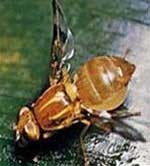American scientists warn that the impact of the blood-sucking bug should be taken seriously, as it causes the deaths of 10,000 people each year worldwide.
While health experts often warn about mosquitoes and other disease-carrying insects, the blood-sucking bug—also known as the triatomine bug—poses a significant risk as well.

A triatomine bug. (Photo: Fox News).
It is estimated that these bugs account for the deaths of 10,000 people annually across the globe.
Triatomines carry the Trypanosoma cruzi parasite, which causes Chagas disease, a condition that can be fatal if not treated promptly.
Most fatalities are attributed to Trypanosoma cruzi, which invades the human body and wreaks havoc on the heart and digestive system of the affected individuals.
Amy Rowland, a spokesperson for the CDC, stated that cases of Chagas from triatomines are quite rare and usually require multiple bites.
Chagas disease was first identified in the United States in 1909. To date, it is believed to affect around 300,000 people, primarily Latin American immigrants in Texas, California, and Florida.
The CDC warns that a particularly dangerous aspect of Chagas is its transmissibility, as it can be spread from person to person through organ transplants and blood transfusions.
Additionally, mothers can transmit Chagas to their children during pregnancy.
Moreover, many victims may be unaware that they are infected because there are often no symptoms. When symptoms do occur, they typically manifest as fever, fatigue, swollen lymph nodes, and other “flu-like” symptoms.
By the time patients begin to realize they are ill, symptoms often have progressed to a more severe stage. Between 20-30% of those infected experience heart and digestive issues.





















































